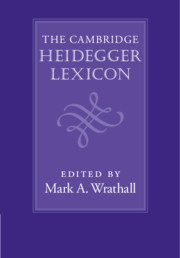Book contents
- The Cambridge Heidegger Lexicon
- Series page
- The Cambridge Heidegger Lexicon
- Copyright page
- Contents
- Contributors
- Preface
- Acknowledgments
- Using the Lexicon
- Chronology of Martin Heidegger
- Abbreviations for Heidegger’s Works
- A
- B
- C
- 32. Care (Sorge)
- 33. Certainty (Gewissheit)
- 34. Circumspection (Umsicht)
- 35. Clearing (Lichtung)
- 36. Closeness (Nähe)
- 37. Cognition (Erkenntnis)
- 38. Communication (Mitteilung)
- 39. Comportment (Verhalten, or Verhaltung)
- 40. Concept (Begriff)
- 41. Confrontation (Auseinandersetzung)
- 42. Conscience (Gewissen)
- 43. Consciousness (Bewusstsein)
- 44. Constancy (Ständigkeit)
- 45. Constitution (Konstitution)
- 46. Constitution (Verfassung)
- 47. Context (Zusammenhang)
- 48. Coping (Umgang)
- 49. Correspondence (Entsprechung)
- 50. Curiosity (Neugier)
- D
- E
- F
- G
- H
- I
- J
- K
- L
- M
- N
- O
- P
- R
- S
- T
- U
- V
- W
- German–English Glossary
- Bibliography
- Index
42. - Conscience (Gewissen)
from C
Published online by Cambridge University Press: 17 April 2021
- The Cambridge Heidegger Lexicon
- Series page
- The Cambridge Heidegger Lexicon
- Copyright page
- Contents
- Contributors
- Preface
- Acknowledgments
- Using the Lexicon
- Chronology of Martin Heidegger
- Abbreviations for Heidegger’s Works
- A
- B
- C
- 32. Care (Sorge)
- 33. Certainty (Gewissheit)
- 34. Circumspection (Umsicht)
- 35. Clearing (Lichtung)
- 36. Closeness (Nähe)
- 37. Cognition (Erkenntnis)
- 38. Communication (Mitteilung)
- 39. Comportment (Verhalten, or Verhaltung)
- 40. Concept (Begriff)
- 41. Confrontation (Auseinandersetzung)
- 42. Conscience (Gewissen)
- 43. Consciousness (Bewusstsein)
- 44. Constancy (Ständigkeit)
- 45. Constitution (Konstitution)
- 46. Constitution (Verfassung)
- 47. Context (Zusammenhang)
- 48. Coping (Umgang)
- 49. Correspondence (Entsprechung)
- 50. Curiosity (Neugier)
- D
- E
- F
- G
- H
- I
- J
- K
- L
- M
- N
- O
- P
- R
- S
- T
- U
- V
- W
- German–English Glossary
- Bibliography
- Index
Summary
Conscience is “the call of care from the uncanniness of being-in-the-world – the call which summons Dasein to its ownmost ability-to-be-guilty” (SZ 289). Heidegger introduces the term as part of his account of how Dasein, lost to itself in the anonymity of the anyone (das Man), can grasp authenticity as a possibility for itself. Starting with certain aspects of our ordinary understanding of conscience as having to do with particular deeds and actions, Heidegger develops an “ontological” definition that targets essential features of selfhood.
- Type
- Chapter
- Information
- The Cambridge Heidegger Lexicon , pp. 176 - 178Publisher: Cambridge University PressPrint publication year: 2021
- 1
- Cited by

